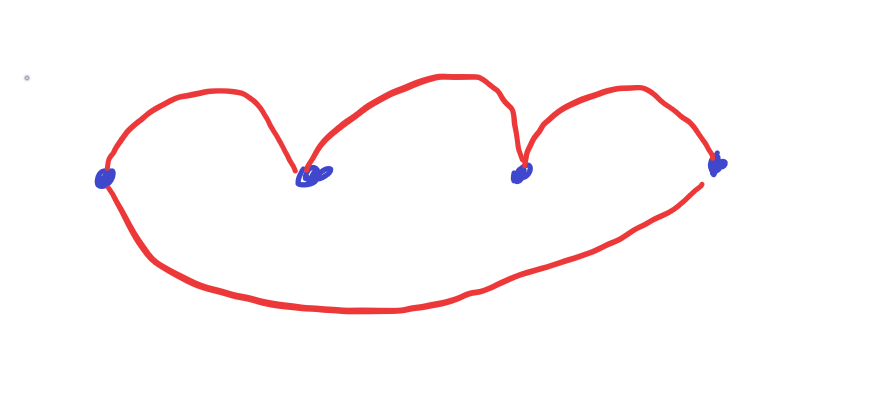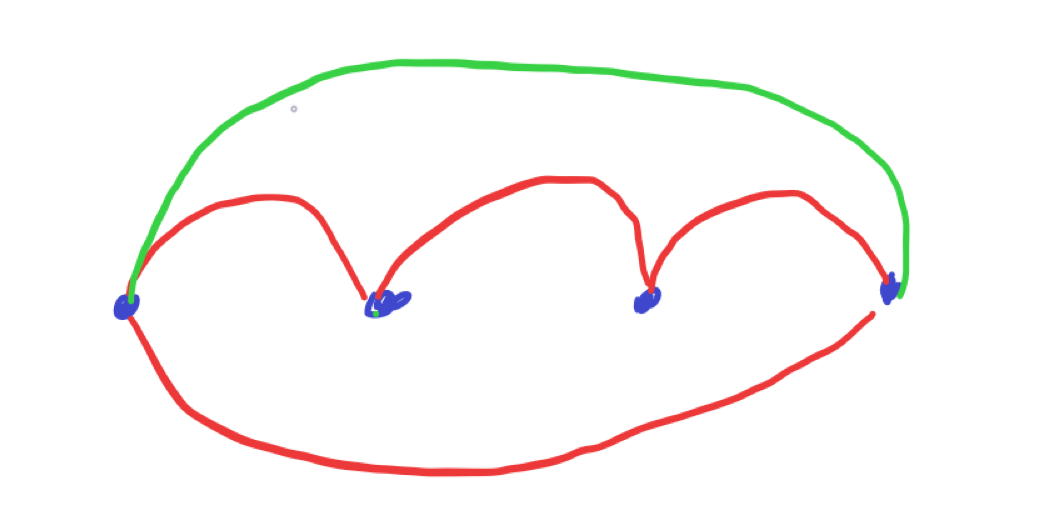SMU Summer 2024 Contest Round 3
SMU Summer 2024 Contest Round 3
寻找素数对
题意
给你一个偶数,找到两个最接近的素数,其和等于该偶数。
思路
处理出 1e5 以内的素数,然后遍历,更新最接近的答案。
代码
#include<bits/stdc++.h> using namespace std; using i64 = long long; vector<int> euler_range(int n) { vector<int> phi(n + 1), prime; vector<bool> is_prime(n + 1, true); is_prime[1] = 0, phi[1] = 1; for (int i = 2; i <= n; i++) { if (is_prime[i]) prime.push_back(i), phi[i] = i - 1; for (int j = 0; j < (int)prime.size() && i * prime[j] <= n; j++) { is_prime[i * prime[j]] = 0; if (i % prime[j]) phi[i * prime[j]] = phi[i] * (prime[j] - 1); else { phi[i * prime[j]] = phi[i] * prime[j]; break; } } } return prime; } const int N = 1e5; auto pr = euler_range(N); int main() { ios::sync_with_stdio(false); cin.tie(nullptr); int x; set<int> s(pr.begin(), pr.end()); while (cin >> x) { int a = 0, b = 0; for (auto i : pr) { if (i > x) break; if (s.count(x - i)) { if (!a) a = i, b = x - i; else if (abs(x - i - i) < abs(a - b)) a = i, b = x - i; } } if (a > b) swap(a, b); cout << a << ' ' << b << '\n'; } return 0; }
抱歉
题意
平面上有 n 个点,每个点至少有 2 条曲线线段连接,所有曲线线段不相交,但是任意两点之间可以有多条曲线,问你 n 个点将平面分成了 m 份中存在的曲线线段数量。
思路
满足最小的条件,即每个点都能有两条曲线线段相连的图中最少有 n 条线段。
如图:

可以看出,最小符合条件的连线方式将平面分成了 2 份,又因为两点之间可以有多条曲线,所以每增加一个面只需要加一条曲线即可。
如图:

所以答案就是 \(n+m-2\),记得开longlong。
代码
#include<bits/stdc++.h> using namespace std; using i64 = long long; int main() { ios::sync_with_stdio(false); cin.tie(nullptr); i64 n,m; while(cin >> n >> m && n && m){ cout << n + m - 2 << '\n'; } return 0; }
搬寝室
题意
从 n 个物品中选出 2k 个物品,每两个物品产生的贡献是其重量差值的平方,求最小的贡献值。
思路
n 个选 2k 个,考虑dp。
因为要求差值的平方最小,所以我们将物品按重量按差值排序,排序后相邻的物品其重量差值相对最小。
然后处理出第 i 个物品与 i + 1 个物品间的差值平方。
设 \(dp_{i,j}\) 为前 i 个物品中搬运 j 次的最小贡献。
对于第 i 个物品,如果选择它,则答案是 i-1 物品与它的贡献加上 \(dp_{i-2,j-1}\) 时的贡献,如果不选,那答案就等于 \(dp_{i-1,j}\) 。
代码
#include<bits/stdc++.h> using namespace std; using i64 = long long; int main() { ios::sync_with_stdio(false); cin.tie(nullptr); int n, k; while (cin >> n >> k) { vector<i64> w(n + 1); for (int i = 1; i <= n; i ++) cin >> w[i]; sort(w.begin() + 1, w.end()); vector<vector<i64>> dp(n + 1, vector<i64>(k + 1, LLONG_MAX / 2)); vector<int> val(n + 1); for (int i = 1; i < n; i ++) { val[i] = pow(w[i + 1] - w[i], 2); } for (int i = 0; i <= n; i ++) dp[i][0] = 0; for (int i = 2; i <= n; i ++) for (int j = 1; j * 2 <= i && j <= k; j ++) { dp[i][j] = min(val[i - 1] + dp[i - 2][j - 1], dp[i - 1][j]); } cout << dp[n][k] << '\n'; } return 0; }
Nuts
题意
累加 n 个数大于 10 的部分。
思路
按题意模拟。
代码
#include<bits/stdc++.h> using namespace std; using i64 = long long; int main() { ios::sync_with_stdio(false); cin.tie(nullptr); int n; cin >> n; int ans = 0; while (n --) { int x; cin >> x; ans += max(0, x - 10); } cout << ans << '\n'; return 0; }
Happy Birthday! 2
题意
给你一个含有 N 个正整数的序列 A,请你构造两个序列 B 和 C。
设这两个序列长度分别为 𝑥x 和 𝑦y,则应满足:
- \(1≤𝑥,𝑦≤𝑁\)
- \(1≤𝐵_𝑖,𝐶_𝑖≤𝑁\) 且两序列均严格递增
- \(B\) 与 \(C\) 互异
- \(∑_{𝑖=1}^𝑥𝐴_{𝐵_𝑖}≡∑_{𝑗=1}^𝑦𝐴_{C_i}( mod 200)\)
其中互异的定义:若 \(𝑥≠𝑦\) 或 \(𝑥=𝑦\) 但存在一个位置 𝑖 使得 \(𝐵_𝑖≠𝐶_𝑖\),则 \(B\) 与 \(C\) 互异。
思路
结论,在 201 个序列中一定存在两个在模 200 的情况余数相等的序列。
证明:若前面 200 个序列的余数两两不等,则第 201 个序列一定与前面某个序列的余数相等。
考虑到当 \(n=8\) 时,其子集序列达到了 256,所以我们可以直接枚举其所有子集,找到满足条件的序列,\(n < 8\) 时也是直接暴力枚举找到答案即可,\(n > 8\) 时必定有解,按照 \(n=8\) 的做法即可。
枚举时注意从 1 开始,因为最少要有一个被选。
代码
#include<bits/stdc++.h> using namespace std; using i64 = long long; int main() { ios::sync_with_stdio(false); cin.tie(nullptr); int n; cin >> n; const int p = 200; vector<i64> w(n); for (auto &i : w) cin >> i; n = min(n, 8); map<int, vector<int>> mp; auto print = [](vector<int> num) { cout << num.size() << ' '; for (auto i : num) cout << i << " \n"[i == num.back()]; }; for (int i = 1; i < 1 << n; i ++) { i64 sum = 0; vector<int> tmp; for (int j = 0; j < n; j ++) { if ((i >> j) & 1) { sum = (sum + w[j]) % p; tmp.push_back(j + 1); } } if (mp.count(sum)) { cout << "Yes\n"; print(mp[sum]); print(tmp); return 0; } else mp[sum] = tmp; } cout << "No\n"; return 0; }
Bowls and Dishes
题意
有 n 道菜和 m 个条件限制,每个条件要求第 \(A_i\) 道菜和第 \(B_i\) 道菜都有人投票才算满足,现有 k 个人,每个人可以在第 \(C_i\) 道菜和第 \(D_i\) 道菜中选择一个投票,现问你每个人投票后满足条件的菜的数量最多有多少。
思路
因为 k 最大只有 16 ,所以直接枚举即可。
0 表示第 i 个人投 \(C_i\) 道菜,1 表示其投 \(D_i\) 道菜。
代码
#include<bits/stdc++.h> using namespace std; using i64 = long long; int main() { ios::sync_with_stdio(false); cin.tie(nullptr); int n, m; cin >> n >> m; vector<array<int, 2>> ab(m); for (auto &[a, b] : ab) cin >> a >> b; int k; cin >> k; vector<array<int, 2>> cd(k); for (auto &[c, d] : cd) cin >> c >> d; int ans = 0; for (int i = 0; i < 1 << k; i ++) { vector<int> dish(n + 1); for (int j = 0; j < k; j ++) { dish[cd[j][(i >> j) & 1]] ++; } int res = 0; for (auto [a, b] : ab) res += (dish[a] && dish[b]); ans = max(ans, res); } cout << ans << '\n'; return 0; }
Rush Hour 2
题意
给定一张 𝑛 个点,𝑚 条边的无向图,每条边有两个属性 \(c_i,d_i\)。
你现在位于点 1,想要前往点 𝑛,现在的时间是 0。当时间为 𝑡 时经过第 𝑖 条边所需的时间是 $c_i+\lfloor \frac{d_i}{t+1}\rfloor $ 。
你可以在城市中停留任意非负整数时间,请求出你到达点 𝑛n 所花费的最短时间,如果无法到达,输出 -1。
思路
假设当前时间为 t,经过第 i 座城市,则当前答案为 \(t + c_i+\lfloor \frac{d_i}{t+1}\rfloor\),仔细观察 \(t + \frac{d}{t+1}\),转化为 \(t+1+\frac{d}{t+1}-1\) ,其实就是中学时常说的对勾函数,当且仅当 \(t+1=\sqrt d\) 即 \(t=\sqrt d -1\) 时,取得最小值,所以当走到第 i 座城市的时候,判断一下该时的时间有没有到达 \(\sqrt d -1\),没有就等到这个时候再走,大于这个时间直接走即可,其余就是普通的 \(dijkstra\) 。
代码
#include<bits/stdc++.h> using namespace std; using i64 = long long; int main() { ios::sync_with_stdio(false); cin.tie(nullptr); int n, m; cin >> n >> m; vector g(n + 1, vector<array<int, 3>>()); for (int i = 0; i < m; i ++) { int u, v, c, d; cin >> u >> v >> c >> d; g[u].push_back({v, c, d}); g[v].push_back({u, c, d}); } vector<i64> dis(n + 1, -1); using ar2 = array<i64, 2>; priority_queue<ar2, vector<ar2>, greater<>> Q; dis[1] = 0; Q.push({0, 1}); while (Q.size()) { auto [time, u] = Q.top(); Q.pop(); if (dis[u] < time) continue; for (auto &[v, c, d] : g[u]) { i64 t = time, okt = round(sqrt(d)) - 1; if (t < okt) t = okt; if (dis[v] == -1 || dis[v] > t + c + d / (t + 1)) { dis[v] = t + c + d / (t + 1); Q.push({dis[v], v}); } } } cout << dis[n] << '\n'; return 0; }
Count Descendants
题意
-
给出一个 \(n\) 个点的有根树,节点编号为 \(1, 2, \cdots n\),树根为 \(1\),第 \(i\)(\(2 \le i \le n\))号节点的父亲是 \(p_i\)。
-
给出 \(q\) 个查询,第 \(i\) 个查询包含 \(a_i, b_i\),计算满足以下条件的点 \(u\) 的个数:
1、 \(a_i\) 位于 \(u\) 到 \(1\) 的最短路径上(端点也算);
2、\(u\) 到根上的路径恰好有 \(b_i\) 条边。
-
\(n, q \le 2 \times 10^5, 0 \le b_i < n\)。
思路
前置知识:时间戳——树中的应用 - 岸南 - 博客园 (cnblogs.com)
由第一个条件可知满足条件的节点一定是 \(a_i\) 自己或是其子孙,判断其子孙可以采用时间戳,若一个点的 \([Tin_u,Tout_u]\) 被 \([Tin_{a_i},Tout_{a_i}]\) 包含。那么 u 就是 \(a_i\) 的子孙节点。
由第二个条件可得,从根节点到 u 的边就是指的 u 在树中的深度。
那么我们按照深度将节点的时间戳存进去,由于 dfs 是深度优先搜索,那么存进去的时间戳一定是升序排列,那么我们只要二分去找到该深度中被 \(a_i\) 的时间戳包含的个数就是我们要求的答案了。
代码
#include<bits/stdc++.h> using namespace std; using i64 = long long; int main() { ios::sync_with_stdio(false); cin.tie(nullptr); int n; cin >> n; vector g(n + 1, vector<int>()); for (int i = 2; i <= n; i ++) { int x; cin >> x; g[x].push_back(i); } int timer = 0; map<int, vector<int>> mp; vector<int> tin(n + 1), tout(n + 1); auto dfs = [&](auto && self, int u, int d)->void{ tin[u] = timer ++; mp[d].push_back(tin[u]); for (auto v : g[u]) { self(self, v, d + 1); } tout[u] = timer ++; }; dfs(dfs, 1, 0); int q; cin >> q; while (q--) { int u, d; cin >> u >> d; auto end = lower_bound(mp[d].begin(), mp[d].end(), tout[u]); auto start = lower_bound(mp[d].begin(), mp[d].end(), tin[u]); cout << end - start << '\n'; } return 0; }
To 3
题意
给你一个数,问你最少删除其中哪些位后使得该数能够被 3 整除。
思路
因为数最大只有 1e18,也就是最多只有 18 位,那么枚举一下删掉哪些位即可。
代码
#include<bits/stdc++.h> using namespace std; using i64 = long long; int main() { ios::sync_with_stdio(false); cin.tie(nullptr); i64 n; cin >> n; i64 ans = -1; i64 len = 1, shi = 1, t = n / 10; while (t) { len ++, shi *= 10, t /= 10; } for (int i = 0; i < 1ll << len; i ++) { i64 res = 0, num = 0, t10 = shi; for (int j = 0; j < len; j ++) { if (!((i >> j) & 1)) res = res * 10 + (n / t10 % 10); else num ++; t10 /= 10; } if (res && res % 3 == 0) { if (ans == -1) ans = num; else ans = min(ans, num); } } cout << ans << '\n'; return 0; }
本文作者:Ke_scholar
本文链接:https://www.cnblogs.com/Kescholar/p/18294108
版权声明:本作品采用知识共享署名-非商业性使用-禁止演绎 2.5 中国大陆许可协议进行许可。





【推荐】国内首个AI IDE,深度理解中文开发场景,立即下载体验Trae
【推荐】编程新体验,更懂你的AI,立即体验豆包MarsCode编程助手
【推荐】抖音旗下AI助手豆包,你的智能百科全书,全免费不限次数
【推荐】轻量又高性能的 SSH 工具 IShell:AI 加持,快人一步